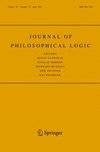格热戈日克和怀特海点:故事仍在继续
IF 0.7
1区 哲学
0 PHILOSOPHY
引用次数: 0
摘要
本文致力于在基于区域的框架内分析点的两个开创性定义:一个是怀特海(1929 年)的定义,另一个是格热戈日克(《综合》,12(2-3), 228-235 1960 年)的定义。我们以 Biacino & Gerla (Notre Dame Journal of Formal Logic, 37(3), 431-439 1996) 的工作为基础,改进了他们的结果,解决了有关怀特海和格热戈日克点之间相互关系的一些未决问题,并提出了有待今后研究的未决问题。本文章由计算机程序翻译,如有差异,请以英文原文为准。
Grzegorczyk and Whitehead Points: The Story Continues
The paper is devoted to the analysis of two seminal definitions of points within the region-based framework: one by Whitehead (1929) and the other by Grzegorczyk (Synthese, 12(2-3), 228-235 1960). Relying on the work of Biacino & Gerla (Notre Dame Journal of Formal Logic, 37(3), 431-439 1996), we improve their results, solve some open problems concerning the mutual relationship between Whitehead and Grzegorczyk points, and put forward open problems for future investigation.
求助全文
通过发布文献求助,成功后即可免费获取论文全文。
去求助
来源期刊

JOURNAL OF PHILOSOPHICAL LOGIC
PHILOSOPHY-
CiteScore
2.50
自引率
20.00%
发文量
43
期刊介绍:
The Journal of Philosophical Logic aims to provide a forum for work at the crossroads of philosophy and logic, old and new, with contributions ranging from conceptual to technical. Accordingly, the Journal invites papers in all of the traditional areas of philosophical logic, including but not limited to: various versions of modal, temporal, epistemic, and deontic logic; constructive logics; relevance and other sub-classical logics; many-valued logics; logics of conditionals; quantum logic; decision theory, inductive logic, logics of belief change, and formal epistemology; defeasible and nonmonotonic logics; formal philosophy of language; vagueness; and theories of truth and validity. In addition to publishing papers on philosophical logic in this familiar sense of the term, the Journal also invites papers on extensions of logic to new areas of application, and on the philosophical issues to which these give rise. The Journal places a special emphasis on the applications of philosophical logic in other disciplines, not only in mathematics and the natural sciences but also, for example, in computer science, artificial intelligence, cognitive science, linguistics, jurisprudence, and the social sciences, such as economics, sociology, and political science.
 求助内容:
求助内容: 应助结果提醒方式:
应助结果提醒方式:


